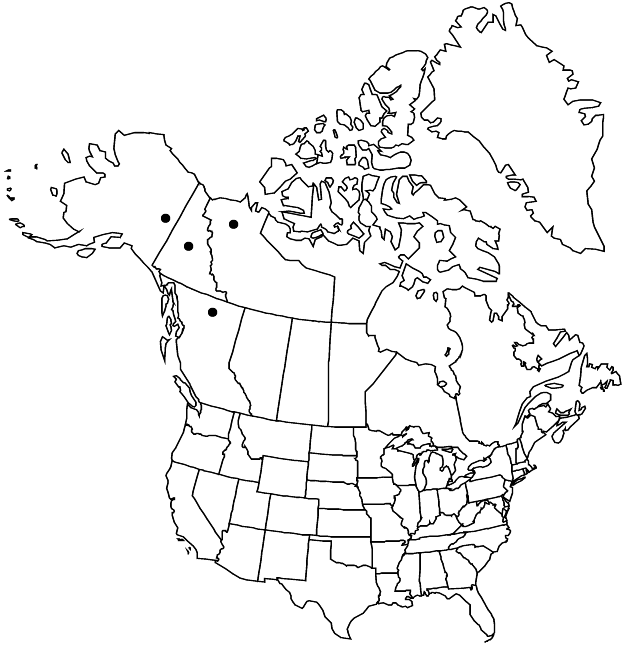Minuartia yukonensis
Ark. Bot., n. s. 7: 521968.
Plants perennial, mat-forming. Taproots stout, woody. Stems erect to ascending, green, 10–30 cm, minutely retrorsely pubescent proximally, flowering stems stipitate-glandular, usually densely so, internodes of flowering stems 3–5 times as long as leaves. Leaves tightly overlapping (vegetative), variably spaced (cauline), usually connate proximally, with tight, scarious to herbaceous sheath 0.5–1.8 mm; blade straight to outwardly curved, green, flat, 3-veined abaxially, midvein more prominent than 2 lateral veins, filiform-linear, 10–18 × 0.8–1.3 mm, flexuous, margins not thickened, scarious, ciliate, often sparsely so, apex green, often with white callosity, acuminate-pungent, flat to slightly navicular, shiny, glabrous; axillary leaves present among vegetative leaves. Inflorescences 3–13-flowered, open cymes; bracts lanceolate, herbaceous. Pedicels 2–5 cm, densely stipitate-glandular. Flowers: hypanthium cup-shaped; sepals prominently 3-veined, lanceolate to oblong-lanceolate (herbaceous lanceolate to oblong-lanceolate), 6–8 mm, not enlarging in fruit, apex green to purplish, rounded, hooded, stipitate-glandular, especially proximally; petals oblanceolate, 1.3–1.5 times as long as sepals, apex rounded, entire. Capsules narrowly ellipsoid, 7–10 mm, longer than sepals. Seeds reniform, ca. 1 mm, tuberculate.
Phenology: Flowering spring–summer.
Habitat: Dry, rocky slopes and meadows, scree slopes into alpine zone
Elevation: 0-1000 m
Distribution

B.C., N.W.T., Yukon, Alaska, Asia (Russian Far East).
Discussion
Minuartia yukonensis is an amphi-Beringian species, reported from two sites in the Russian Far East. Some collections of it may be labeled as Arenaria laricifolia Linnaeus, a European species to which Alaskan material has been misattributed.
Selected References
None.